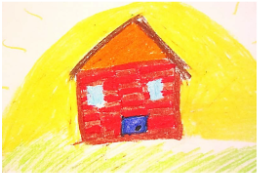
Let's recap some key strategies for success in working with children (and youth) with complexities.
1 Breathe. Deeply.
This is a key strategy for adults.
This is also a key strategy to teach children and youth.
10 deep breaths can significantly impact physiological functioning and increase thinking capacity. We move out of fight/flight/freeze/surrender and move out of emotional overwhelm. And we can get to calm. Breathe. Deeply. Want to try something fun? Dove's Breathe video
2 Gratitude
The "attitude of gratitude" moves us into healthier places (physically and mentally). What we choose to focus our attention on is profoundly important. Want to watch something profound? The Happy Movie
3 Self Talk
Harnessing our "inside chatter" (self-talk, auditory internal dialogue, etc.) allows us to remember to be grateful, and remember to breathe deeply. Some people use the "STOP!" command, and follow that by a carefully chosen command, like "RELAX! Relax! relax." What to see this in action? Try Rick Hansen's Hardwiring the brain for happiness.
3.5 Come to Peace with What is
Ever try to make a castle out of thin air? Kind of nice in our heads, but that is the only place it exists. Coming to peace with "what is" allows us to work with what is actually present. That allows us to begin seeing strengths and gaps. It allows us to "give up the ghost" on that which is not real, at least not right now.
4 Work with Strengths
All of us have strengths. All of us have weaknesses or lagging skills. Starting from what we can do makes it easier to risk. We need to work with our own strengths, and the strengths of the children in our care.
5 Small, Targeted Gains
Finally, as in the nature of any great creation, choosing small "doable" steps in new areas of learning is key. If it were easy for us (or children/youth) it would already have been learned. Creating opportunities to learn in small chunks, and practice new skills with support is a necessary step for many of our children/youth.
How about an example? Juan temper tantrums regularly. He is now 10 and having difficulty at home and at school with most academic tasks, and at home with cleaning his room and doing homework.
At home, as a parent (or caregiver by any other name!) we can:
1. Breathe deeply. Teach Juan to breathe deeply. Practice this 10 times a day.
2. Make gratitude lists. Read them. Read them aloud. Post them on the wall.
3. Create an internal "audio loop" for the adult to reframe what is happening.
"Juan is learning"
"Juan needs some time to calm down and then we can talk."
"Juan is a good boy with lagging skills"
"Juan needs me to be calm so I can help him."
"I am good enough dad. Juan is coming along"
"I am a good enough mom. Juan is learning."
4. Juan loves music. He listens to his choice of music while cleaning his room.
5. Juan's disordered room is first brought into order by an adult. Eventually, when Juan gets these skills into place, he will choose what goes where. For now, an adult helps.
Now "cleaning" means a five (5) minute focus (300 seconds) on picking up clothes. Juan is successful at this. Once he does this in 3 minutes "cleaning" now also includes making his bed. When he is successful he can pick a song from YouTube and play it for the whole family. Small, doable targetted gains.
At school, as an educator we can:
1. Breathe deeply. Teach Juan to breathe deeply. Practice this 10 times a day.
2. Make gratitude lists. Read them. Read them aloud. Post them on the wall.
3. Create an internal "audio loop" for the adult to reframe what is happening.
"Juan is learning"
"Juan needs some time to calm down and then we can talk."
"Juan is a good boy with lagging skills"
"Juan needs me to be calm so I can help him."
"I am good enough dad. Juan is coming along"
"I am a good enough mom. Juan is learning."
4. Juan loves music. He listens to his choice of music while working on a non-preferred task. He gets to listen to music as long as he stays on task.
5. How to help Juan to focus at school, and learn in areas that have been challenging for him? The teacher makes a plan (and involves his dad for the instrument portion):
Juan's schoolwork is tied to what he likes (music) and he researches and writes about his favourite band.He compares different types of music using diagrams. He does mathematics problems that refer to music (e.g., beats per minute, drum sticks, how far the band travels, etc.) He listens to music while doing math, as long as he stays focused. Social studies includes what music was popular in the era and land being studied. He has a project that spans home and school (i.e., making a "drumstick guitar). Both the music teacher and his father are involved. Small, doable targetted gains.
Each one of these is explored in previous posts (in one way or another!)